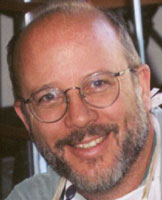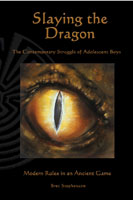Print This Page
|
Click to View All Speakers
|

Bret Stephenson
|
Bret Stephenson is an adolescent counselor who has worked with teens from more than 100 countries. Specializing in archetypal adolescent approaches, he specializes in issues related to the loss of initiation and rites of passage.
Bret Stephenson MA
Owner--The Adolescent Mind
Executive Director--Labyrinth Center
3386 South Upper Truckee Road
South Lake Tahoe, CA 96150
bret@adolescentmind.com
530-577-6920 |

|
Plenary #60): A Mile Wide and An Inch Deep: Modern Adolescent Discontent & America's Shallow Approach to Teens
America invented the concept of modern adolescence, and by letting go of tried & true archetypal approaches, created the need for teen 'control': group homes, treatment centers, juvenile halls, medication and incarceration.
Workshop #218): Archetypal Adolescent Development: Controlling the Uncontrollable
Modern America has shifted away from approaches with teens that worked successfully for millennia. Without truly understanding the process of adolescence in it’s largest sense, most approaches miss the mark and fail to impact teens as we adults hope.
Workshop #58): Why 'Just Say No' Just Hasn't Worked: Teens and Non-Ordinary States of Consciousness (B)
Most adults misunderstand the archetypal drive for teens to experience altered states of consciousness. Raised in a culture permeated with legal and illegal drugs, teens gravitate to unhealthy risks due to the lack of healthy, ceremonial means to alter consciousness.
Details:
Plenary #60): A Mile Wide and An Inch Deep: Modern Adolescent Discontent & America's Shallow Approach to Teens
American teens are languishing in a system with little depth, a disregard for developmental needs, and a general misunderstanding of the adolescent process in general. As a result, modern American teens dubiously lead the world in violence, gangs, drug/alcohol addiction, eating disorders, crime, incarceration and other behaviors that did not exist one hundred years ago. Understanding archetypal adolescent development is critical for determining what it is we are really trying to accomplish with teens other than just “controlling” them.
This talk will take a cross-cultural and historical look at the world of teens, as well as changes experienced decade by decade through the 20th century. Through brief historical looks at media, literature, publications and other dynamics in the past 100 years, attendees will see how adolescence as we know it is a cultural invention. How did countless cultures deal with adolescence for millennia without the need to control, incarcerate or medicate their teens? What happened when we took teens out of the adult world of work and sent them into the classroom? How has modern, compulsory education affected modern teens, and is that model being effective or has it reached a point of diminishing return.
Archetypal adolescent dynamics are approaches that are universal and applicable to all teens, regardless of where or when they exist on the planet. Most traditional cultures created healthy teens and had nowhere near the problems with them that we are experiencing in modern times. It is critical to understand how adolescence looks on any given day, in any given culture. Modern America has created the need for most adolescent control systems, while overlooking the overall process and goals of adolescence. In essence, most modern approaches conflict with archetypal adolescent developmental dynamics.
Workshop #218): Archetypal Adolescent Development: Controlling the Uncontrollable
This workshop sets the stage for the following workshop: Teens and Non-Ordinary States of Consciousness: Why ‘Just Say No’ Just Hasn’t Worked!!. There is a universal aspect of adolescence that most traditional cultures worked with successfully for thousands of years. Without the need for incarceration or medication, most societies helped guide their teens into adulthood without the stereotypic drama we associate with modern adolescence. Adolescence in modern times has an almost pathological, political incorrectness feel to it, as if teens are inherently damaged or broken. Historically, this is far from the truth.
This workshop will examine the universal, archetypal model of adolescence. In essence, we’ll explore how adolescence looks cross-culturally and throughout history. How does, or did, adolescence look at any given time in history, in any culture? This is of growing importance in modern America with such a growing ethnic diversity to work with. Many approaches developed for one group of teens often will fail with another. Understanding archetypal dynamics helps youth workers create models and programs that are most effective for the most teens. Many modern youth workers do not have an accurate understanding of the universal adolescent developmental dynamics common to all teens. In short, without fully understanding what teens should look like on a “perfect day” they keep using approaches and methods that fail to break through the developmental barriers. Many youth workers literally do not know what it is they are trying to achieve other than some form of behavioral change.
Numerous developmental issues and stages will be discussed, including the Search for Identity, Individuation, Leave-Taking Behavior, Paradox/Abstracting
Choices and Control, Puberty, Idealism: Music, Pride, Egocentricity, Sex, Peer Pressure, Curiosity, NonOrdinary States of Consciousness, and Ceremony & Ritual. Workshop participants will come away with a deep and workable understanding of the overall adolescent process.
Workshop #58): Why 'Just Say No' Just Hasn't Worked: Teens and Non-Ordinary States of Consciousness (B)
‘Just Say No’ has been an idealistic and simplistic hope that teens
will simply have the will power or skills necessary to avoid peer
pressure to avoid using drugs. Logic and reason seem to have bounced off modern adolescents. A number of factors are contributing to the fact that American teens use more drugs and alcohol than their global counterparts. While naively hoping teens will avoid drug usage, modern America’s adults lead the world in legal drug usage. Youth workers need to understand how the pervasiveness of drugs, both legal and illegal, impact how teens feel and act around drugs.
Inherent to adolescence is a universal drive to experience
Non-Ordinary States of Consciousness but no safe model or cultural ceremonial means to do so exists. Indeed, it is a universal human trait to desire to alter one’s consciousness. Historically and cross-culturally, this has been done without high addiction rates through ceremony and ritual, declining aspects of modern society. If adolescents are not given healthy access to altered states, we can continue to expect them to take unhealthy paths to altered consciousness.
Finally, the continued breakdown of the modern family leads to deep adolescent discontent and the need to medicate emotions. As cultural teen psychology becomes more pathological, and clinical practitioners medicate more youth, teens are becoming addicted on more and more levels than just recreationally. The proclivity of prescribed medications has reached almost epidemic proportions as parents, teachers and doctors try to control teen behavior with medication, then try paradoxically to teach the same teens not to use drugs to alter their behavior. Alternatives to drugs and a discussion of adolescent addiction vs. adult addiction will be included.
Contact Info:
Bret Stephenson M.A.
3386 S. Upper Truckee Rd.
South Lake Tahoe, California 96150
phone: 530-577-6920
cell: 530-318-6920
fax: 530-577-8415
bret@adolescentmind.com
|
Click to View All Speakers
|

